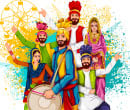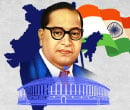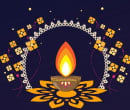
-
Customer Care 9999 091 091
- Consult Now
-
Notifications
-
Dussehra or Vijay Dashmi is a celebrated festival of the Hindus that commemorates the victorious triumph of Lord Rama over the King of Lanka, the ten-headed demon king, Ravana after he abducted Goddess Sita. This festival is celebrated on the tenth day of the month of Ashvina, according to the Hindu Panchang. This year, the festival of Rama’s victory will be celebrated on the 2nd of October with increased zeal and enthusiasm.
 Dussehra Muhurat
Dussehra Muhurat
 Dussehra Muhurat
Dussehra Muhurat
Dashami Tithi Begins - 07:01 PM on Oct 01, 2025
Dashami Tithi Ends - 07:10 PM on Oct 02, 2025
Dashami Tithi Begins - 12:50 PM on Oct 20, 2026
Dashami Tithi Ends - 02:11 PM on Oct 21, 2026
Dashami Tithi Begins - 09:01 AM on Oct 09, 2027
Dashami Tithi Ends - 11:40 AM on Oct 10, 2027
Dashami Tithi Begins - 08:08 AM on Sep 27, 2028
Dashami Tithi Ends - 09:55 AM on Sep 28, 2028
Dashami Tithi Begins - 04:38 AM on Oct 16, 2029
Dashami Tithi Ends - 05:23 AM on Oct 17, 2029
Dashami Tithi Begins - 06:53 PM on Oct 05, 2030
Dashami Tithi Ends - 05:32 PM on Oct 06, 2030
Dashami Tithi Begins - 09:50 PM on Oct 24, 2031
Dashami Tithi Ends - 07:45 PM on Oct 25, 2031
Dashami Tithi Begins - 06:18 PM on Oct 13, 2032
Dashami Tithi Ends - 03:46 PM on Oct 14, 2032
The name of this festival comes from two Sanskrit words- “dasha,” meaning ten, and “hara,” which means defeat. It is a day that celebrates the defeat of Ravana in the battle against Lord Rama, the king of Ayodhya. It is celebrated in the seventh month of Ashvina, on the day when the full moon appears in the sky. The bright fortnight of Shukla Paksha also coincides with the nine-day festival of Navratri and the tenth day of Durga Puja, adding a lot more fervor to the celebrations. Furthermore, this day marks the beginning of the preparations for the biggest festival of the Hindus, Diwali that takes place 20 days after Dussehra.
The festival is eagerly awaited by both young and old. The festivities for this day begin with kids making a statue of Ravana and the adults preparing for the puja in the evening. Let us look at the puja vidhi for this day below-
Use chuna or lime powder to make an image of Ravana burning on the floor.
Place ten cow dung cakes around the image.
Offer a plate full of flowers, fruits, sweets, roli, jowar, and rice to the image.
Perform the puja of the cow dungs with Ganga jal, jowar grown during Navratri, roli, chawal, and moli.
Light an incense stick and Diya next to the image.
Perform the parikrama of the image created.
After you end the puja, offer Dakshina and food to Brahmins.
Sisters should put a tikka on the forehead of their brothers, receiving gifts from them on this occasion.
The prasad is distributed among family and friends, who then get together to enjoy a hearty dinner.
Filled with pride, Ravana dared to imprison Lord Shani for trying to interject in the plot to gain invincibility for Meghnath. When Lord Hanuman visited the kingdom of Lanka to meet Goddess Sita, he heard the cries of Shani dev from a dark cell. He rescued Shani dev from captivity. Grateful for this, Lord Shani granted a boon according to which he would not cast an evil eye on anyone who is a devotee of Lord Hanuman. Since that day, it has been believed that worshipping Lord Hanuman can help devotees escape the harmful effects of Shani’s Sadhe Sati or Shani Drishti.
Ravana was the king of Lanka. Despite being an extremely learned man, he was overtaken by pride, blinding him with the idea that he was all-powerful. He symbolizes the vice of ego. Lord Rama was the king of Ayodhya. He was the Maryada Purushottam, abiding by dharma and the ideals of morality in his life. He stands for Goodness. This festival represents that constant struggle between the good and the bad that exists in every man at not only the physical but also the mental and emotional levels. When the divine or the spirit of the Lord enters our lives, the stronghold of ego weakens and gets destroyed. When an individual surrenders their soul to the Lord, they are overtaken by unconditional love. This love brings divine knowledge into the life of the devotee, symbolizing the victory of good over evil, just like Rama conquered over Ravana.
Many rituals are performed to commemorate the significance behind this day. Let us take a look at some of the prominent rituals that make this festival so special:
Ramlila is an important feature of this festival, one that is eagerly awaited by both young and old. The story of Ramayana is brought to the stage as kids adorn costumes and perform the story of Rama’s victory over Ravana. Ramlila is performed in every locality on open grounds where hundreds of people gather to celebrate the triumph of Lord Rama.
Effigies of Ravana along with his son Meghnath and brother Kumbhkaran are traditionally burnt amidst fireworks. These effigies are built months in advance and filled with firecrackers that are a major attraction for children on this day of the festival.
Processions are taken out on the streets as kids dress up as Lord Rama, Goddess Sita, Laxman, and Lord Hanuman, blessing pedestrians with good health and prosperity.
In East India, Dussehra dates and time coincide with the finale of Durga Puja in the states of West Bengal and Odisha. On this day, the idols of Goddess Durga are taken to the nearest water bodies and immersed, performing the visarjan ceremony amidst much fanfare.
This day also coincides with Vidyarambam which is celebrated in the Southern states of the country like Kerala, Tamil Nadu, and Karnataka. On this day, devotees worship Goddess Saraswati, the goddess of wisdom. Alphabets are written on a plate full of raw rice from sacred books, initiating learning on this auspicious day.
As per the epic of Ramayana, this festival marks the victory of Lord Rama over the ten-headed demon king of Lanka, Ravana. The Maryada Purushottam killed Ravana because he kidnapped his beloved wife, Goddess Sita. Rescuing his wife from the demon’s captivity, Lord Rama slew the demon king despite his power and fright. The ten heads of Ravana are since then symbolic of the ten vices of envy, pride, anger, false belief, greed, injustice, selfishness, arrogance, hatred, and ego. During this festival each year, the effigies of Ravana, alongside his partners in crime, Meghnath and Kumbhkaran, are burnt to symbolize the burning away of these ten vices from our lives.
This Dussehra 2025, let us pledge to burn all our vices along with the statue of Ravana and let the light of divine knowledge take over our lives. Let us move beyond the materialistic pleasures and embrace the lessons of spirituality we learn from the life of Rama.
To know more about the auspicious Dussehra dates and time, connect with Astroyogi astrologers right away!






| Date | Sunday, 13 April 2025 |
| Tithi | Krishna Pratipada |
| Day | Sunday |
| Paksha | Krishna-Paksha |
| Sunrise | 5:58:11 |
| Sunset | 18:46:24 |
| Moonrise | 19:12:43 |
| Nakshatra | Swati |
| Nakshtra Till | 48 : 14 : 38 |
| Yog | Vajra |
| Yog Till | 46 : 38 : 53 |
| Karan I | Kaulav |
| Surya Rashi | Pisces |
| Chandra Rashi | Libra |
| Rahu Kal | 17:10:22 to 18:46:24 |